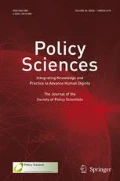Abstract
This chapter focuses on a special type of structural social capital embedded in second-tier indigenous peasant federations in the Andean countries. It first examines the manifestations of this social capital and then goes on to analyze the strategies of the various social actors for its use, mainly to further the interests of poor and oppressed members, but often in the service of broader societal or narrower partisan purposes. Cases are presented to illustrate how such a social capital resource, once created, can be used or transformed for other than the original purposes. Sometimes these spillovers are socially beneficial, confirming the mutability thesis of Hirschman (1984); but in other cases the diversions can be harmful and disempowering. The authors conclude that even considering these varied uses, meso-level peasant federations, when incorporated into rural development policies, can help to achieve equity and sustainability.
Similar content being viewed by others
References
Bebbington, A. (2001). Globalized Andes? Peasant Organizations, Livelihoods and Landscape. Forthcoming in Ecumene: A Journal of Cultural Geography, Vol. 8, No. 3.
Bebbington, A. and T. Carroll (2000). Induced Social Capital and Federations of the Rural Poor. Social Capital Initiative Working Paper No. 19. Washington, DC: The World Bank.
Blair, H. (1997). Democratic Local Governance in Bolivia. USAID/CDIE Impact Evaluation No. 6.
Blauert, J. and S. Zadek, eds. (1998). Mediating Sustainability-Growing Policy from the Grassroots. New Hartford, CT: Kumarian Press.
Brown, D. and D. Ashman (1996). ‘Participation and social capital and intersectoral problem solving,’ World Development 24 (9), 1467-1479.
Cameron, J. (2000). Municipal Decentralization in Rural Ecuador: A Political Opportunity for Democracy and Development? Paper prepared for the LASA Conference, Miami, March 16-18, 2000.
Carroll, Th. F. (1998). ‘Indigenous organizations, protest and human rights in Ecuador,’ in J.D. Montgomery, ed., Human Rights-Positive Policies in Asia and the Pacific Rim. Hollis, NH: Hollis.
Carter, M. and B. Barham (1996). ‘Level playing fields and laissez faire: postliberal development strategy in inegalitarian agrarian economies,’ World Development 24 (7), 1133-1149.
De Janvry, A., E. Sadoulet and E. Thorbecke (1993). ‘Introduction’ (to a set of papers for a conference on the changing balance between state, market and civil organizations in development strategies), World Development 21 (4), 565-575.
Dobyns, H., P. Doughty and H. Lasswell (1971). Peasants Power and Applied Social Changeö-Vicos as a Model. Beverly Hills/London: Sage.
Doughty, P. (1987). ‘Against the odds: Collaboration and development at Vicos,’ in D. Stull and J. Schensul, eds., Collaborative Research and Social Change. Boulder: Westview Press, pp. 129-157.
Durston, J. (1998). Building Social Capital in Rural Communities (Where It Does Not Exist). Paper prepared for the Latin American Studies Association Annual Meetings, Chicago, September 24-26, 1998.
Durston, J. (2000). Rural Football in Southern Andes and Social Capital. A Research Note, Santiago de Chile: Social Development Division ECLAC.
Figueroa, J.A. (1997). ‘Comunidades indígenas: Artefactos de construcción de la identidad é tnica en los conflictors políticos del Ecuador contemporaneo,’ Revista Colombiana de Antropologia 33, 186-216.
Foley, M.W. and R. Edwards (1997). ‘Escape from politics? Social theory and the social capital debate,’ American Behavioral Scientist 40 (6), 550-561.
Fox, J. (1996). ‘How does civil society thicken? The political construction of social capital in Mexico,’ World Development 24 (6), 1089-1103.
Harriss, J. and P. De Renzio (1997). ‘Missing link’ or analytically missing? The concept of social capital: An introductory bibliographic essay,' Journal of International Development 9 (7), 919-937.
Hirschman, A. (1984). Getting Ahead Collectively: Grassroots Experiences in Latin America. Oxford: Pergamon Press.
Kleymeyer, Ch. D., ed. (1994). Cultural Expression and Grassroots Development: Cases from Latin America and the Caribbean. Boulder: Lynn Reinner.
Lucero, J. (2000). Community, Nationality and Politics of Representation: Reflection from Ecuador. Paper prepared for the Conference of the Latin America Studies Association (LASA), Miami, March 16-18, 2000.
Minkoff, D.C. (1997). ‘Producing social capital-National social movements and civil society,’ American Behavioral Scientist 40 (5), 606-619.
Montgomery, J.D. (1998). Bureaucrats and People-Grassroots Participation in Third World Development. Baltimore: The Johns Hopkins University Press.
North, L. L. and J. Cameron (1998). Grassroots-Based Rural Development Strategies: Ecuador in Comparative Perspective. Paper prepared for meeting of the Latin American Studies Association (LASA), Chicago: September 24-26, 1998.
O'Neill, K. (1998). Social Capital in a Multi-Ethnic Society. Paper prepared for the Annual Meeting of the American Political Science Association, Boston, September 3-6, 1998.
Ostrom, E. (1992). Crafting Institutions for Self-Governing Irrigation Systems. San Francisco: Institute for Contemporary Studies.
Pierce, M.H. (1997). ‘Popular participation bolivian style: Decentralizing political and economic power,’ Hemisphere 7 (3), 6-8.
Psacharopoulos, G. and H.A. Patrinos (1994). Indigenous People and Poverty in Latin America: An Empirical Analysis. Washington: World Bank.
Selverston, M.H. (1994). ‘The politics of culture: Indigenous peoples and the state in Ecuador,’ in D. LeeVan Cott, ed., Indigenous Peoples and Democracy in Latin America, New York: St. Martins Press.
Uphoff, N. (1999). ‘Understanding social capital: Learning from the analysis and experience of participation,’ in P. Dasgupta and I. Serageldin, eds., Social Capital: A Multifaceted Perspective. Washington: World Bank.
Woolcock, M. (1998). ‘Social capital and economic development: Toward a theoretical synthesis and policy framework,’ Theory and Society 27 (2), 151-208.
Author information
Authors and Affiliations
Rights and permissions
About this article
Cite this article
Carroll, T.F., Bebbington, A.J. Peasant federations and rural development policies in the Andes. Policy Sciences 33, 435–457 (2000). https://doi.org/10.1023/A:1004824803848
Issue Date:
DOI: https://doi.org/10.1023/A:1004824803848




